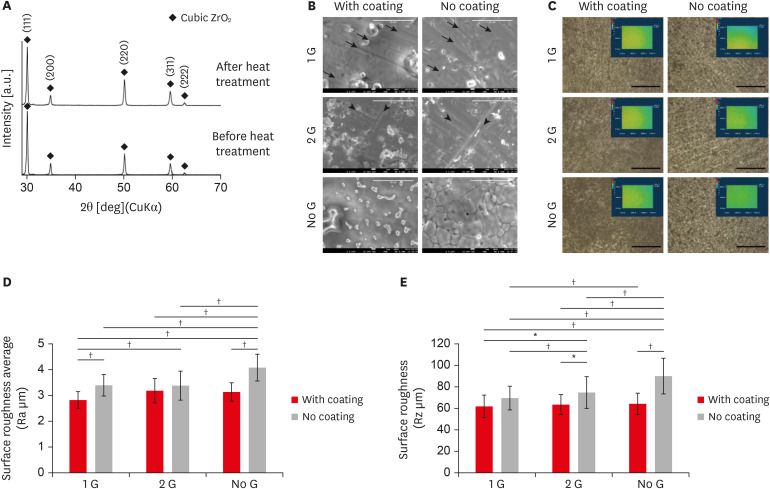-
Cytotoxicity and biocompatibility of high mol% yttria containing zirconia
-
Gulsan Ara Sathi Kazi, Ryo Yamagiwa
-
Restor Dent Endod 2020;45(4):e52. Published online October 14, 2020
-
DOI: https://doi.org/10.5395/rde.2020.45.e52
-
-
 Abstract Abstract
 PDF PDF PubReader PubReader ePub ePub
- Objectives
Yttria-stabilized tetragonal phase zirconia has been used as a dental restorative material for over a decade. While it is still the strongest and toughest ceramic, its translucency remains as a significant drawback. To overcome this, stabilizing the translucency zirconia to a significant cubic crystalline phase by increasing the yttria content to more than 8 mol% (8YTZP). However, the biocompatibility of a high amount of yttria is still an important topic that needs to be investigated. Materials and MethodsCommercially available 8YTZP plates were used. To enhance cell adhesion, proliferation, and differentiation, the surface of the 8YTZP is sequentially polished with a SiC-coated abrasive paper and surface coating with type I collagen. Fibroblast-like cells L929 used for cell adherence and cell proliferation analysis, and mouse bone marrow-derived mesenchymal stem cells (BMSC) used for cell differentiation analysis. ResultsThe results revealed that all samples, regardless of the surface treatment, are hydrophilic and showed a strong affinity for water. Even the cell culture results indicate that simple surface polishing and coating can affect cellular behavior by enhancing cell adhesion and proliferation. Both L929 cells and BMSC were nicely adhered to and proliferated in all conditions. ConclusionsThe results demonstrate the biocompatibility of the cubic phase zirconia with 8 mol% yttria and suggest that yttria with a higher zirconia content are not toxic to the cells, support a strong adhesion of cells on their surfaces, and promote cell proliferation and differentiation. All these confirm its potential use in tissue engineering.
-
Citations
Citations to this article as recorded by  - Phase-separated Zr70-Al12.5Fe17.5Y (x = 0–25 at.%) metallic glasses with suitable mechanical properties for possible implant applications
Devinder Singh, Parthiban Ramasamy, Anna Sophie Jelinek, Verena Maier-Kiener, Rahul Bhattacharya, Zhuo Chen, Elham Sharifikolouei, Alessandro Calogero Scalia, Ziba Najmi, Andrea Cochis, Simon Fellner, Eray Yüce, Christoph Gammer, Zaoli Zhang, Jürgen Ecker
Journal of Materials Research and Technology.2025; 35: 6468. CrossRef - Extreme temperature gradient promoting oxygen diffusion in yttria‐stabilized zirconia: A molecular dynamics study
Jian Guo, Yan Yin, Min Yi
Journal of the American Ceramic Society.2024; 107(10): 6783. CrossRef - Bioceramics: a review on design concepts toward tailor-made (multi)-functional materials for tissue engineering applications
Ritesh Kumar, Ipsita Pattanayak, Pragyan Aparajita Dash, Smita Mohanty
Journal of Materials Science.2023; 58(8): 3460. CrossRef - In Vitro Degradation of Mg-Doped ZrO2 Bioceramics at the Interface with Xerostom® Saliva Substitute Gel
Liliana Bizo, Marieta Mureşan-Pop, Réka Barabás, Lucian Barbu-Tudoran, Antonela Berar
Materials.2023; 16(7): 2680. CrossRef - Processing of gelatine coated composite scaffolds based on magnesium and strontium doped hydroxyapatite and yttria-stabilized zirconium oxide
Aleksa Galic, Tamara Matic, Natasa Obradovic, Zvezdana Bascarevic, Djordje Veljovic
Science of Sintering.2023; 55(4): 469. CrossRef - Biocompatibility of ZrO2 vs. Y-TZP Alloys: Influence of Their Composition and Surface Topography
Alex Tchinda, Laëtitia Chézeau, Gaël Pierson, Richard Kouitat-Njiwa, B H Rihn, Pierre Bravetti
Materials.2022; 15(13): 4655. CrossRef - Influence of oxygen vacancy compensation on the structure, electronic and mechanical properties of yttrium stabilized tetragonal zirconia
Zhou Fan, Yang Wang, Yidong Zhang, Jianyi Liu
Materials Science in Semiconductor Processing.2021; 135: 106082. CrossRef
-
240
View
-
5
Download
-
7
Crossref
|




